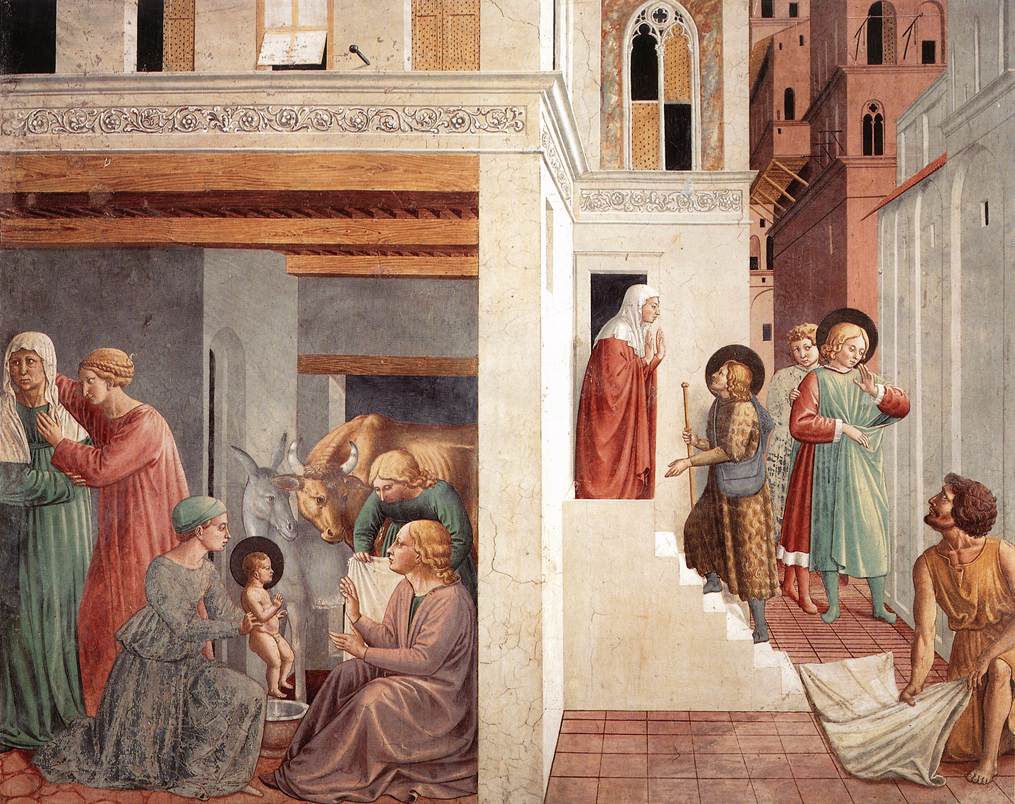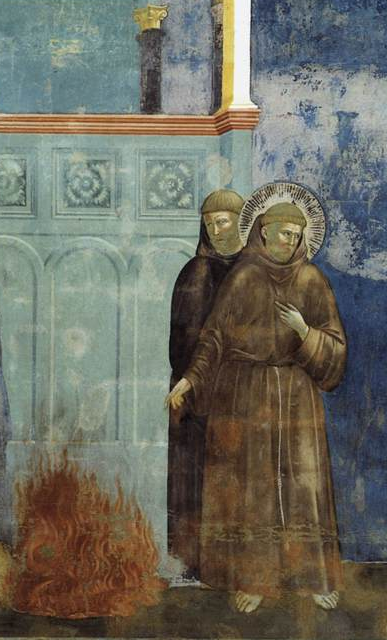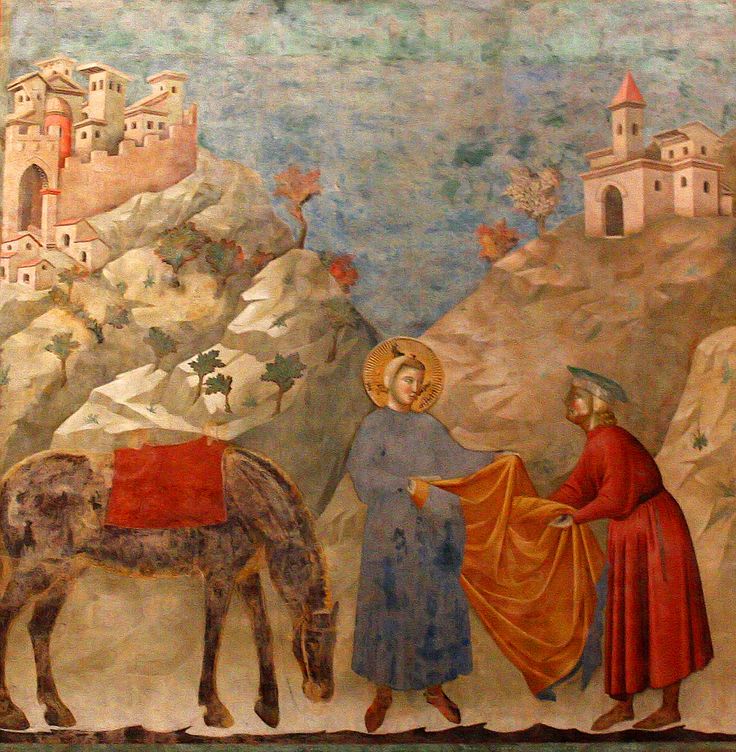Chapter 1: How Francis Was Born and Came to be Called Francis

Chapter 1: How Francis Was Born and Came to be Called Francis
Francis’ father was named Pietro, the son of the merchant Bernardone. Unlike Francis’ mother, Pica – an excellent holy woman — Pietro’s absorbing passion was the making of money.
It was while Pietro was away in France on business that Pica went into labour. She bore a son, and wished him to be called John, for she wanted to name him after Saint John the Baptist. When Francis got older, he always considered the feast of Saint John the Baptist the greatest celebration of all the feasts of the Saints, such was the impression his baptismal name left upon him. His disciples too saw a mysterious significance to this name. For – as they said – what John is among the Saints, Francis is among the founders.
At that time, the time of his birth, there was a pilgrim passing through Assisi. On the day on which Francis was baptised, the pilgrim came to the Bernadone residence to beg for alms. When alms were given him, the stranger said to the maid who assisted him, “Show me, I beg thee, the child born today. How much I long to see him!”
“Impossible!” the maid replied, and showed the pilgrim that she wished him off on his way, post-haste! Yet the foreigner would not leave. So the maid made as if to leave herself instead, but secretly she watched him, looking to see if he would turn around and go. But leave he did not. He stood outside the door. He stayed, standing still. He stood still as a statue. The maid felt annoyed, and in an expression of this mood went and closed the door on him – rather rudely, it must be confessed – and so went her way. But when Lady Pica was informed about what had happened, she seemed amazed, as if she were pondering it all. Then she gave instructions to the maid to do as the pilgrim asked.
The maid went and took the child to show him to the stranger who with great joy and tenderness took the babe into his arms, speaking thusly: “Two are born in Assisi today. This: among the best; the other: among the worst.” But he did not say who the other was.
As Francis grew up – all the way to his 25th year – and began wasting all his time in jokes, games, vanity, lewd words, bawdy songs, his mother oft remembered such an unusual event as this. And so would she say, as much to reassure herself as others, “What do you suppose shall become of my son? I’ll tell you! By God’s grace, he will become a son of God!”
Already had the lad been baptised “John” when at long last Pietro returned. As he entered the house, his heart was aflame with passion. A fire blazed within, a flame of love for France, the country he had just left. Seeing his newborn son, his passion redoubled and overflowed, and he said, “No longer shall his name be John, but,” he insisted, “his name will be Francis” (which was an unusual name at that time). And so it was.
From the very beginning it thus occurred that the lad’s name pointed beyond his native soil, as if he were destined to go beyond the mountains and the sea until he had reached the earth’s utmost portions. In this way too his destiny was prophesied, to the glory of God. Amen.
Sources: Legenda Trium Sociorum (3S.1); 2 Celano (2C.1); Van Speyer, 1.
Meditation: A Vocation
I have loved thee with an everlasting love. Thus have I drawn thee with a faithful mercy. (Jer 31:3)
For I know My plans, the thoughts I think over you, says the Lord, thoughts of peace and not affliction, to give you an end and patience. (Jer 29:11)
In the two Scripture passages from Jeremias, quoted above, the Lord speaks of His everlasting love — His perpetual charity (caritate perpetua) — with which He draws us, miserans, that is, having mercy on us. The Hebrew word for mercy — hesed — includes the idea of mercy, but it is even richer than the idea of mercy, because it includes the idea of kindness, steadfast love, and, especially, covenental fidelity. We have translated it as faithful mercy, for God wishes to enter into a covenanted relationship with you, and He is faithful to His covenant.
The second Scripture speaks of God’s thoughts or plans — the Hebrew word machashabah means both — which are for your good. These thoughts that are from eternity are the eternal plan of God. He has loved you with an everlasting love, for His thoughts towards you have been from eternity, a plan for your good.
In Saint Francis we see this plan unfolding in an extraordinary fashion. Watching the plan of God unfold for him reveals a hint of the workings of providence in each of us. The calling of Saint Francis is like an image of the vocation, indeed of every monk, yet also of every Christian. For God says to each of us what He said to Jeremias: “Before I formed thee in the womb I knew thee” (Jer 1:5). Each of us, like Saint Francis, can experience according to God’s own measure of grace the providential guidance of God such that “to them that love God, all things work together unto good, to such as, according to His purpose, are called to be saints” (Rom 8:28).
A Mother’s Recollection
We can almost hear in these infant stories the recollections of Blessed Pica. What mother would not look back to try to see the significance of the events that seemed to portend her child’s future greatness? Blessed Pica keeps these things in her heart, and perhaps we are to see in this a biblical reference. Saint Francis’ infancy narrative, and even his very name of “John” reminds us of Luke chapter 1.
If these initial stories are meant to remind us of biblical parallels we must also recognize that Saint Francis’ life until he conversion is not very reminiscent of these biblical models. We shall soon see that young Francis showed no signs of being a saint. Yet through all the dark years, Blessed Pica held on to these portents of hope and did not lose her confidence. Perhaps, like another Saint Monica, the aching of her maternal heart helped to merit the grace of Saint Francis’ conversion later on.
God’s Plans
Saint Paul says that God chose us from before the foundation of the world to be saints (Eph 1:4) God is rich in mercy, and has an exceedingly great love of charity towards us, and because of that, He has called us (4:1), He has made us one body and one Spirit (4:4), and to each of us He has given a gift, a grace according to the measure of the donation of Christ (4:7).
We can see an example of God’s election looking at Jacob and Esau.
Before the twins were born or had done anything good or bad—in order that God’s purpose in election might stand: not by works but by Him Who calls—she was told, “The older will serve the younger.” (Rom 9:11-12)
God’s plan for Jacob included him being the father of the chosen people from which would come the Saviour in Whom “all the nations of the earth would be blessed” (Gen 22:18). So God chose Jacob before either he or Esau had merited anything good or bad. Yet God’s plan for Jacob unfolded in the context of his own strengths and weaknesses. Was it God’s perfect plan that he “buy” the birthright God had intended to give him? or that he “steal” the blessing by a practical lie? Perhaps it was because of these things that he had to flee the promised land, was deceived by his uncle, and ended up afraid of his brother Esau! Though God’s plan was not foiled, it unfolded in the context of a real human life.
God’s Providential Fidelity
The 20th century Trappist, Dom Vital Lehodey, explains in his superb work entitled Holy Abandonment:
It is true that in disposing of His rational creatures He [God] respects their liberty. They have consequently the power to oppose their own wills to His will and apparently to thwart it. But in reality he has foreseen from all eternity the resistance of some and the submission of others, and He has formed His designs in the light of that prescience. In the infinite resources of His omnipotent wisdom He easily finds a way to change hindrances into helps, and to make the plots which demons and wicked men contrive for our ruin a means to our progress in virtue. ‘‘ My counsel shall stand,” so He speaks through Isaias, ‘‘ and all My will shall be done”’ (Is.xlvi, 10).
“I Have My Mission–I never may know it in this life”
We can learn from this that God’s plans unfold best when we voluntarily cooperate, and to those who abandon themselves to His Providence, all things work for the good (Rom. 8:28). Yet all is not lost when we work by the flesh and not the spirit (cf. Gal 5:16-26), for, in truth, all does not depend upon us. God, in His foreknowledge, has a plan. He has chosen you, and He, like the hound of heaven, is pursuing you. In the words of Saint John Henry Newman:
God knows me and calls me by my name.…
God has created me to do Him some definite service;
He has committed some work to me
which He has not committed to another.
I have my mission—I never may know it in this life,
but I shall be told it in the next.Somehow I am necessary for His purposes…
I have a part in this great work;
I am a link in a chain, a bond of connection
between persons.
He has not created me for naught. I shall do good,
I shall do His work;
I shall be an angel of peace, a preacher of truth
in my own place, while not intending it,
if I do but keep His commandments
and serve Him in my calling.
Therefore I will trust Him.
Though Francis was to walk wayward paths, yet God’s intentions for him were not thwarted, for all that happens is foreknown, and either willed or permitted by God’s providential mercy, and this for our good and not our ill.
Our Cooperation
The mysterious relationship between God’s active role in calling, choosing, pursuing, and perfecting and our response is a mystery that calls for prayerful wonder. We know that God’s plans are good, and that He is faithful to pursue us. Yet we also know that we really can harden our hearts to His grace.
As the life of Saint Francis demonstrates, God knows this, and His plans for us can accommodate even our resistance. That is a joy, indeed!
And yet the Saints also teach us the need to cooperate. Saint Faustina wrote in her diary (1556):
[T]he Lord gave me to know that, among His chosen ones, there are some who are especially chosen, and whom He calls to a higher form of holiness, to exceptional union with Him. These are seraphic souls, from whom God demands greater love than He does from others. Although all live in the same convent, yet He sometimes demands of a particular soul a greater degree of love. Such a soul understands this call, because God makes this known to it interiorly, but the soul may either follow this call or not. It depends on the soul itself whether it is faithful to these touches of the Holy Spirit, or whether it resists them. I have learned that there is a place in purgatory where souls will pay their debt to God for such transgressions.
What mercy! Even when a soul resists the promptings of the grace to follow a special particular vocation, God does not wish to reject this soul, but rather to cleanse her in purgatory!
Bernard Ruffin, in his biography of Saint Padre Pio, tells of something similar that the Saint said.
When Dr. Sanguinetti died and someone asked Padre Pio if he were in heaven, he answered, “There are some souls destined to attain a high level of glory, and if they haven’t attained it on earth, they attain it after a stay in purgatory.”
This should be encouraging, and a little frightening. Encouraging because it does not all depend on us: God knows His plans, and even our infidelities to the graces He gives us does not frustrate them. Frightening because our infidelities do have consequences, consequences that increase our suffering and restrict the field of the influence of our good works. Imagine if Saint Francis had not corresponded eventually to the call the Lord was giving Him!
Francis’ Correspondence
Even were it possible that one could so harden his heart that God’s perfect plan for him — God’s plan for the particular way this person was to participate in the divine work of “uniting of all things in Christ” (Eph 1:10) — would not come to fruition for this person on earth, this was not the case with Saint Francis thus gives us both an image in his younger days of God’s faithfulness to those who are not faithful and of God’s pursuit of sinners; and then, after his conversion, Francis becomes an image of God’s desire for us to “bear much fruit” (John 15:8), and the wondrous way in which God works when we abandon ourselves completely to Him.
A Mysterious Covenant
All of this is to say that God is an active partner in bringing about His good plan for your life. He has entered into a mysterious covenant with your soul, and He is more involved by His foresight and providential purposes in your life than the most loving parents are in the lives of their little children. He knows His plans, and even if it were possible resist to the end, He is powerful, nonetheless works “all things for the good” (Rom. 8:28).
Looking Back
Once someone has found his vocation, he sometimes looks back at the (perhaps) messy life that preceded it, and is amazed to see the signs of the vocation and the way all things worked together, perhaps in most unlikely ways. A monastic vocation, for instance, is deeply precious in the sight of God, and God, Who from all eternity offered it and foresaw that a man would be formed by the grace of this vocation, had been preparing the future monk for a whole lifetime wherein he may not have had an inkling of what was to come.
This is what is happening here with Saint Francis. His mother, looking back, sees these events as significant signs. Yet truly they are significant!
It was not strictly speaking inevitable that Francis would accept the grace he encountered, and yet God always foreknew that he would. With His Own active assistance, God was preparing Francis his whole life long for his future mission. It is, therefore, entirely reasonable for those who knew him later on to look back and see the signs that portended this vocation, a vocation that was, in a truly significant way, part of God’s plan for the Church and even for the consummation of all things. Blessed be God in His angels and in His Saints!



